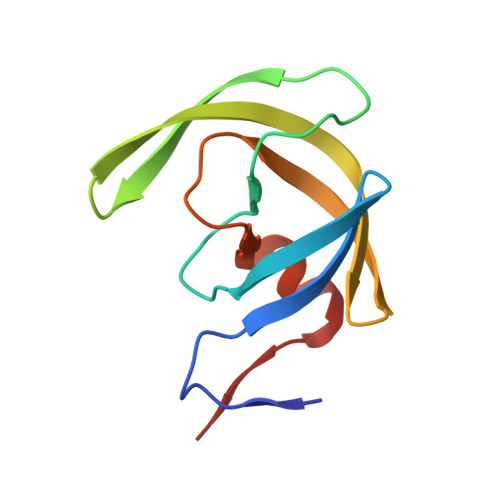A structural and thermodynamic escape mechanism from a drug resistant mutation of the HIV-1 protease.
Vega, S., Kang, L.-W., Velazquez-Campoy, A., Kiso, Y., Amzel, L.M., Freire, E.(2004) Proteins 55: 594-602
- PubMed: 15103623
- DOI: https://doi.org/10.1002/prot.20069
- Primary Citation of Related Structures:
1MRW, 1MRX, 1MSM, 1MSN - PubMed Abstract:
The efficacy of HIV-1 protease inhibition therapies is often compromised by the appearance of mutations in the protease molecule that lower the binding affinity of inhibitors while maintaining viable catalytic activity and substrate affinity. The V82F/I84V double mutation is located within the binding site cavity and affects all protease inhibitors in clinical use. KNI-764, a second-generation inhibitor currently under development, maintains significant potency against this mutation by entropically compensating for enthalpic losses, thus minimizing the loss in binding affinity. KNI-577 differs from KNI-764 by a single functional group critical to the inhibitor response to the protease mutation. This single difference changes the response of the two inhibitors to the mutation by one order of magnitude. Accordingly, a structural understanding of the inhibitor response will provide important guidelines for the design of inhibitors that are less susceptible to mutations conveying drug resistance. The structures of the two compounds bound to the wild type and V82F/I84V HIV-1 protease have been determined by X-ray crystallography at 2.0 A resolution. The presence of two asymmetric functional groups, linked by rotatable bonds to the inhibitor scaffold, allows KNI-764 to adapt to the mutated binding site cavity more readily than KNI-577, with a single asymmetric group. Both inhibitors lose about 2.5 kcal/mol in binding enthalpy when facing the drug-resistant mutant protease; however KNI-764 gains binding entropy while KNI-577 loses binding entropy. The gain in binding entropy by KNI-764 accounts for its low susceptibility to the drug-resistant mutation. The heat capacity change associated with binding becomes more negative when KNI-764 binds to the mutant protease, consistent with increased desolvation. With KNI-577, the opposite effect is observed. Structurally, the crystallographic B factors increase for KNI-764 when it is bound to the drug-resistant mutant. The opposite is observed for KNI-577. Consistent with these observations, it appears that KNI-764 is able to gain binding entropy by a two-fold mechanism: it gains solvation entropy by burying itself deeper within the binding pocket and gains conformational entropy by losing interaction with the protease.
Organizational Affiliation:
Department of Biology, The Johns Hopkins University, Baltimore, MD 21218, USA.















